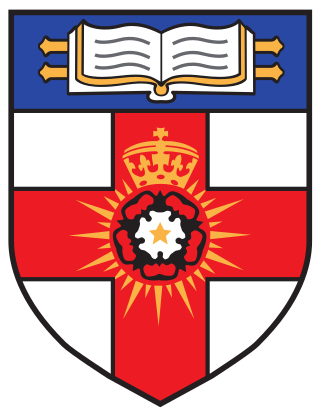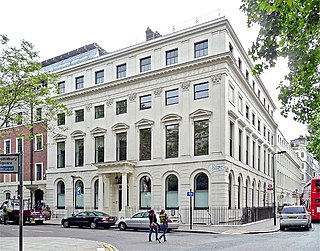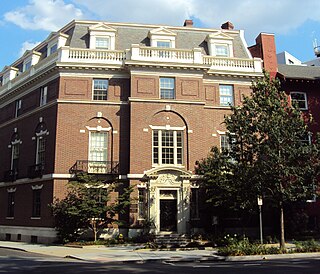Related Research Articles

World War II or the Second World War was a global conflict between two alliances: the Allies and the Axis powers. Nearly all of the world's countries, including all of the great powers, participated in the conflict, and many invested all available economic, industrial, and scientific capabilities in pursuit of total war, blurring the distinction between civilian and military resources. Aircraft played a major role, enabling the strategic bombing of population centres and delivery of the only two nuclear weapons ever used in war. It was by far the deadliest conflict in history, resulting in 70–85 million fatalities. Millions died due to genocides, including the Holocaust, as well as starvation, massacres, and disease. In the wake of Axis defeat, Germany, Austria, Japan and Korea were occupied, and war crime tribunals were conducted against German and Japanese leaders.

The University of London is a federal public research university located in London, England, United Kingdom. The university was established by royal charter in 1836 as a degree-awarding examination board for students holding certificates from University College London, King's College London and "other such institutions, corporate or unincorporated, as shall be established for the purpose of Education, whether within the Metropolis or elsewhere within our United Kingdom". It is one of three institutions to have advertised themselves as the third-oldest university in England. It moved to a federal structure with constituent colleges in 1900. It is now incorporated by its fourth (1863) royal charter and governed by the University of London Act 2018.

The University of Göttingen, officially the Georg August University of Göttingen, is a distinguished public research university in the city of Göttingen, Germany. Founded in 1734 by George II, King of Great Britain and Elector of Hanover, it began instruction in 1737 and is recognized as the oldest university in Lower Saxony.

The Frankfurt School is a school of thought in sociology and critical philosophy. It is associated with the Institute for Social Research founded at Goethe University Frankfurt in 1923. Formed during the Weimar Republic during the European interwar period, the first generation of the Frankfurt School was composed of intellectuals, academics, and political dissidents dissatisfied with the contemporary socio-economic systems of the 1930s: namely, capitalism, fascism, and communism.
Slavic or Slavonicstudies, also known as Slavistics, is the academic field of area studies concerned with Slavic peoples, languages, literature, history, and culture. Originally, a Slavist or Slavicist was primarily a linguist or philologist researching Slavistics. Increasingly, historians, social scientists, and other humanists who study Slavic cultures and societies have been included in this rubric.

The DFS 230 was a German transport glider operated by the Luftwaffe in World War II. It was developed in 1933 by the Deutsche Forschungsanstalt für Segelflug with Hans Jacobs as the head designer. The glider was the German inspiration for the British Hotspur glider and was intended for airborne assault operations.
The School of Advanced Study (SAS), a postgraduate-only institution of the University of London, is the UK's national centre for the promotion and facilitation of research in the humanities and social sciences. It was established in 1994 and is based in Senate House, in Bloomsbury, central London, close to the British Museum, British Library and several of the colleges of the University of London. The School brings together nine research institutes, many of which have long histories, to provide a wide range of specialist research services, facilities and resources. It offers taught master's and research degrees in humanities and social science subjects.

The Warburg Institute is a research institution associated with the University of London in central London, England. A member of the School of Advanced Study, its focus is the study of cultural history and the role of images in culture – cross-disciplinary and global. It is concerned with the histories of art and science, and their relationship with superstition, magic, and popular beliefs.
Walter Ze'ev Laqueur was a German-born American historian, journalist and political commentator. He was an influential scholar on the subjects of terrorism and political violence.
David M. Glantz is an American military historian known for his books on the Red Army during World War II and as the chief editor of The Journal of Slavic Military Studies.
The Institute of Historical Research (IHR) is a British educational organisation providing resources and training for historical researchers. It is part of the School of Advanced Study in the University of London and is located at Senate House. The institute was founded in 1921 by A. F. Pollard.

Iranian studies, also referred to as Iranology and Iranistics, is an interdisciplinary field dealing with the research and study of the civilization, history, literature, art and culture of Iranian peoples. It is a part of the wider field of Oriental studies.
Arthur Geoffrey Dickens was an English academic and author.

Jürgen Rohwer was a German military historian and professor of history at the University of Stuttgart. Rohwer wrote over 400 books and essays on World War II naval history and military intelligence, which gained him worldwide recognition as a prominent historian and a leading authority on U-boats.

The Leo Baeck Institute, established in 1955, is an international research institute with centres in New York City, London, Jerusalem and Berlin, that are devoted to the study of the history and culture of German-speaking Jewry. The institute was founded in 1955 by a consortium of influential Jewish scholars including Hannah Arendt, Martin Buber and Gershom Scholem. The Leo Baeck Medal has been awarded since 1978 to those who have helped preserve the spirit of German-speaking Jewry in culture, academia, politics, and philanthropy.

Sisterdale is an unincorporated farming and ranching community established in 1847 and located 13 miles (21 km) north of Boerne in Kendall County, in the U.S. state of Texas. The community is located in the valley of Sister Creek. The elevation is 1,280 feet (390 m).

The Leo Baeck Institute New York (LBI) is a research institute in New York City dedicated to the study of German-Jewish history and culture, founded in 1955. It is one of three independent research centers founded by a group of German-speaking Jewish émigrés at a conference in Jerusalem in 1955. The other Leo Baeck institutes are Leo Baeck Institute Jerusalem and Leo Baeck Institute London, and the activities of all three are coordinated by the board of directors of the Leo Baeck Institute. It is also a founding partner of the Center for Jewish History, and maintains a research library and archive in New York City that contains a significant collection of source material relating to the history of German-speaking Jewry, from its origins to the Holocaust, and continuing to the present day. The Leo Baeck Medal has been awarded by the institute since 1978 to those who have helped preserve the spirit of German-speaking Jewry in culture, academia, politics, and philanthropy.

The German Historical Institute London (GHIL) is one of the nine independent academic research institutes of the German Historical Institute that are part of the Max Weber Foundation.

The German Historical Institute Washington DC is an institute of historical study based in Washington, D.C. It has been part of the Max Weber Foundation: German Humanities Institutes Abroad since 2002. The director is Simone Lässig.
References
- ↑ "Former Staff". German Historical Institute in the University of London. Retrieved 3 January 2016.